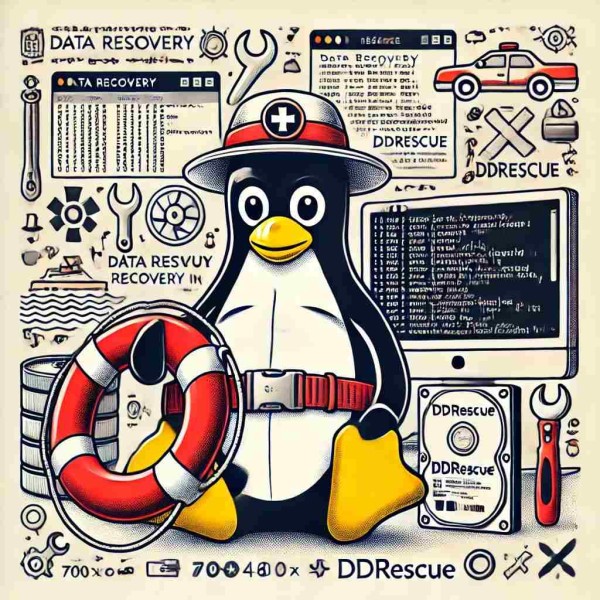Data loss due to hardware failures, system crashes, virus attacks, file system corruption, accidental deletion, or cybercrime can be a frustrating experience, disrupt essential functions, and sometimes lead to financial loss for businesses and individuals.
Fortunately, Linux as a flexible and high-performance platform supports the best data recovery tools that help users restore lost files even after a long time. Here are some top Linux recovery data solutions that are compatible with Linux-specific file systems (such as ext3, ext4, and XFS) and are tailored to work effectively with Linux’s unique environment:
- TestDisk
- extundelete
- PhotoRec
- Foremost
- R-Studio
- Mondo Rescue
- Ddrescue
- Stellar Data Recovery
Nowadays, storing your important data in secure and reliable servers to ensure the security of both personal and enterprise-level data has become an ideal solution. If you are a Linux user, you can Buy Linux VPS that offers an ideal combination of security, reliability, and robust performance, helping you reduce the risk and stress of potential data loss.
8 Powerful Linux Data Recovery Tools
This section provides the specialized features, pros, and cons of the top 8 Linux data recovery tools to help you choose the right tools for Linux to achieve the best result for different data recovery scenarios.
1. TestDisk: Partition-Related Data Recovery
Pros: Free, open-source, support for a range of file systems, compatible with Windows and Mac
Cons: Command-line-based tool with no graphical interface, limited recovery features
TestDisk is one of the most effective and popular open-source data recovery tools for Linux that is designed to recover lost or corrupted partitions. It offers an interactive command-line interface that can simplify the recovery process even for beginners and provides flexibility and control over the retrieving data process. TestDisk is a versatile data recovery tool and compatible with numerous file systems, including FAT12, FAT16, FAT32, NTFS, ext2, and ext3.
TestDisk is a powerful tool that can repair file systems, and partition tables, fix boot issues, and rebuild FAT and NTFS boot structures, in addition to recovering partitions.
Key Features of TestDisk:
- Recovery of lost partitions
- Free to use
- Open source and flexible tool
- Capable of fixing partition tables
- Making non-booting disks bootable again
- Has a quick and streamlined recovery process
- Capable to rebuild MBR
2. Extundelete: Linux Ext3/4 File System Recovery
Pros: Easy to use to recover files, restoring files from specific partitions
Cons: Command line available only without a graphical interface, limited to ext3 and ext4 file systems
Extundelete is a reliable file recovery tool that is designed for Linux file systems like ext3 and ext4. This powerful tool utilizes the ext2fs library to be compatible with attributes of EXT3 and EXT4 file systems.
Extundelete is a command line tool and offers straightforward syntax to recover deleted files from only ext3/ext4 file systems. Extundelete works by navigating the journal of the ext4 filesystem to locate copies of deleted file names or content, enabling users to recover deleted files effectively.
Key Features of Extundelete:
- Excels at recovering accidentally deleted files from the ext3/ext4 file systems
- Simple command structure
- Partition-Level Recovery
- Restore file names and content on the ext4 file system
- Fast data recovery process
3. PhotoRec: Photo, Video, and graphic style media files Recovery
Pros: Open source, free, wide file format support, not file system dependent, deep Scan, compatible with Windows and Mac
Cons: Restricted function for partition recovery, complex and visually outdated graphical user interface

Another useful data recovery tool for Linux is Photorec. This efficient tool is from CGSecurity and is often included with TestDisk. Photorec is tailored to retrieve individual files such as photos, videos, and documents rather than entire partitions.
PhotoRec enables you to recover various file formats seamlessly by supporting over 480 file extensions. This versatile tool excels at recovering data as it can restore lost or deleted files from various storage devices such as hard disks, digital cameras, CDs, memory cards, and USBs. It also can work with damaged file systems since it can directly scan disks.
Key Features of PhotoRec:
- Compatible with all storage devices
- Free-to-use and open-source
- Command line-based tool
- 480 file formats support
- Maximum data retrieval
- User-friendly interface
- Supporting damaged file system
4. Foremost: Data Carving tool for file recovery
Pros: Open source, Efficient Command-Line Interface, File Carving technology, multiple file types support, independent of the file system
Cons: Command-line only, limited features for complex recovery, not able to recover full partition
Foremost is an open-source, command-line, and lightweight tool for file recovery, especially specific file types including images (JPG, PNG), documents (PDF, DOC), audio, and video files. It relies on the "file carving" method, enabling it to recover files based on their headers, footers, and data structures rather than the file system itself.
Foremost is a forensic-based Linux data recovery tool that is available by default on Kali Linux and is supported by other Linux distros. This reliable data recovery tool is effective for severely corrupted file systems and challenging data loss scenarios as it works independently of the file system.
Key Features of Foremost:
- Excellent for data recovery from various media file formats
- Supporting a range of file types (PNG, JPG, PDF, BMP, GIF, AVI, MPG, etc)
- Retrieving iPhone data from the computer
- Working based on File Carving technology
- Fast and Lightweight, requiring minimal system resource
- Simple command-line interface
- Customizable configuration file available to specify a particular file format
- Efficient for retrieving data from an image file
5. R-Studio: Advanced and Safe Linux Data Recovery
Pros: Advanced recovery options, versatility across platforms, extensive file system support, User-Friendly GUI, RAID Recovery, deep data recovery, file preview feature
Cons: paid software, limited recovery capability for trial version, learning curve

The R-Studio is a robust and professional-grade data recovery tool for managing complex data recovery scenarios on damaged or formatted drives. R-Studio is known for its extensive advanced recovery capabilities, making it an ideal choice for deep scanning and locating lost files and partitions in complex cases.
R-Studio works with many file systems such as NTFS, FAT, exFAT, ext2/3/4, HFS+, and APFS, making it versatile for data recovery.
It is also efficient for professional data recovery on RAID configurations. Although it requires technical knowledge and investment, its advanced features make R-Studio a worthwhile choice for challenging data recovery cases.
Key Features of R-Studio:
- Supporting multiple operating systems and file systems
- Effective for RAID recovery
- Capable of creating disk images of damaged drives
- Providing file preview to assess recoverable files
- Offering user-friendly GUI
- Capable of recovering specific data fragments due to a built-in hex editor
- Providing smart scanning
6. Mondo Rescue: Comprehensive Network Drive Backup and Recovery
Pros: Versatile for recovery and backup needs, free, cross-platform compatibility, wide range file systems compatibility
Cons: Command-line based that might be complex for normal users, primarily focused on backup
Mondo Rescue is another command line-based tool for both data backup and recovery needs on Linux systems. Compatibility with a variety of file systems and storage media devices makes Mondo Rescue a powerful tool to restore or back up any type of file system and storage device.
This is a reliable recovery tool that is available for free on most of the popular Linux distributions such as Debian, Ubuntu, Fedora, RHEL, OpenSUSE, etc. Mondo Rescue’s powerful features make it a reliable choice for small to large-sized businesses for long-term data recovery, backup, and restoration.
Mondo Rescue is also known for comprehensive disaster recovery on failed systems or corrupted partitions and even from a non-bootable system. Mondo Rescue also can restore or back Windows devices such as Master Boot Record (MBR).
Key Features of Mondo Rescue:
- Handling both data backup and recovery needs
- Backup and restore on both RAID and non-RAID configuration
- Supporting Windows devices including the MBR
- Handling tasks like resizing, formatting, and creating partitions
- Compatibility with various Linux distributions
- Creating bootable rescue media for restoring data
7. DDrescue: GNU Data Recovery from Damaged Disks
Pros: Open source and free, automated recovery process, bypassing faulty disk sectors for recovery needs
Cons: Command-line only, focused on disk cloning

DDrescue is an open-source command line-based tool under GNU license that is tailored for data recovery from damaged or failing disks. This data recovery tool is compatible with multiple Linux distributions and works by creating a sector-by-sector backup of the damaged drive, ensuring minimum errors in the recovered files.
DDrescue is designed for efficient data recovery, it can restore large amounts of data while bypassing faulty disk sectors and securely transfer data from one failing drive to another.
Key Features of DDrescue:
- Recovering data from damaged disks
- Copying data sector by sector to another device
- Highly efficient and avoids re-reading faulty sectors
- Suitable for disk cloning
- Free to use
8. Stellar Data Recovery: A Premium Solution for Professional Data Recovery
Pros: Partition Recovery, deep scan, disk imaging, user-friendly interface, and wide file system compatibility
Cons: Paid tool, resource-intensive
Stellar Data Recovery is an advanced and user-friendly Linux data recovery, enabling users to effectively recover lost, deleted, or inaccessible files. You can use this powerful tool for partition recovery, formatted drive recovery, and disk imaging. with its user-friendly graphical interface and wide range of robust recovery options, Stellar Data Recovery can retrieve files from both internal and external drives. It is also useful for file recovery from DSLRs, SD cards, and iPhones.
It is compatible with many file systems such as ext2, ext3, ext4, FAT, and NTFS, providing a versatile recovery platform. Stellar Data Recovery is well suited for businesses and professionals needing advanced and reliable recovery tools for various data loss situations.
Key Features of Stellar Data Recovery:
- Cross-platform and compatible with Linux, Windows, and macOS systems
- Intuitive GUI and streamlined recovery process
- Restoring lost or deleted partitions
- supporting a wide range of file systems
- Capable of creating disk images
Top Linux Data Recovery Tools: A Comprehensive Comparison
|
Tool |
Interface |
Key features |
Supported File Systems |
|
Test Disk |
Command-line |
Partition recovery |
FAT12/16/32, NTFS, ext2/3/4 |
|
extundelete |
Command-line |
File recovery |
ext3, ext4 |
|
PhotoRec |
Command-line |
Compatible with 480+ file types, deep scan |
Supporting raw disk without depending on the file system |
|
Foremost |
Command-line |
Specific file type recovery (e.g., images, video, docs) |
Supporting any file systems |
|
R-Studio |
GUI |
Advanced data recovery, RAID recovery |
NTFS, FAT, ext, HFS+, APFS |
|
Mondo Rescue |
Command-line |
Backup and recovery |
ext2/3/4, XFS, JFS, ReiserFS |
|
Ddrescue |
Command-line |
Data recovery, error skipping |
Supporting multiple disk types |
|
Stellar Data Recovery |
GUI |
File/partition recovery |
ext2/3/4, FAT, NTFS |
Practical Tips for Successful Data Recovery
- It is advisable to initiate deleted or lost file recovery as soon as possible for successful recovery.
- Avoid saving new data on a damaged drive as it can overwrite deleted data, making recovery more challenging.
- Use a reliable data recovery tool that is compatible with your file system and storage device.
- Equipe yourself with technical knowledge when dealing with complex data loss scenarios to avoid more data loss.
Choosing the right Linux data recovery tools
Data loss is a stressful experience that can occur for various reasons and lead to vital function interruption and financial loss. Fortunately, a wide range of free and premium data recovery tools are available for Linux to cover a variety of data loss.
For basic file recovery, Extundelete and PhotoRec are top choices whereas, for more complex scenarios, such as restoring data from damaged partitions, TestDisk and rescue are more suitable.
